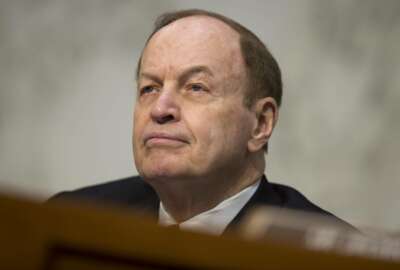To listen to the Federal Newscast on your phone or mobile device, subscribe on PodcastOne or Apple Podcasts. The best listening experience on desktop can be found using Chrome, Firefox or Safari.
- Over 30 veterans service organizations are calling on House and Senate veterans affairs leadership to help secure specific funding for the VA MISSION Act. The president signed the MISSION Act into law earlier this month. The law authorizes a new, consolidated community health care program but doesn’t appropriate enough funding to pay for it. Senate Appropriations Committee Chairman Richard Shelby (R-Ala.) and Vice Chairman Patrick Leahy (D-Vt.) introduced the *Complete the Mission* amendment to the original bill. The amendment would let Congress appropriate needed funding without triggering sequestration. 32 veterans service organizations are calling on Congress to support it. (Disabled American Veterans)
- Congressman Mark Meadows (R-N.C.) wants the IRS to consider slowing down its rate of releasing tax refunds. He said the agency could help stem improper payments by doing so. The Government Accountability Office finds the IRS could reduce improper payments by as much as $350 million a year it delayed refunds by two weeks. (House Oversight and Government Reform Committee)
- Senator Chuck Grassley (R-Iowa) wants answers on overpayments the Defense Department made with TRICARE in 2015 and 2016. Grassley said after the DoD Inspector General reported $81 million in overpayments, there has been no action to correct the matter. Grassley said it seems the IG declared mission accomplished and walked away. (Sen. Chuck Grassley)
- DoD will release a new acquisition policy in the coming days. Shay Assad, director of defense pricing, said he wants the Pentagon to think differently about the current standards the contracting community uses around pricing and cost data. The new policy would encourage contracting officers to negotiate and settle on pricing data for the first year of a sole source contract and use similar data standards to set costs for a second and third year option. The policy would apply to single source procurements for major weapons systems and other military items. (Federal News Radio)
- The Air Force is working on a new strategy to handle is facilities restoration and modernization issues. The service is hoping to make the best investments possible with the budget it has and has asked its major commands to create a master plan for needed construction and repair requirements. (Federal News Radio)
- The Air Force said its fleet of B-1 bombers is flying again after they were temporarily grounded by safety concerns. It ordered all 62 of its B-1s to stop flight operations two weeks ago. That was after an unspecified in-flight emergency forced one of the planes to make an emergency landing in Hawaii, and another in Texas a month earlier. Officials have been investigating potential problems with ejection seat components on board the aircraft, but they said they’re now confident that pilots would be able to safely escape during an emergency. (Federal News Radio)
- The House Oversight and Government Reform Committee wants to know why employees at the Consumer Finance and Protection Bureau are paid so much. The average salary for CFPB employees is $195,000 per year, according to testimony from acting Director Mick Mulvaney. CFPB employees are not paid according to the General Schedule. In a June 20 letter, the committee asked for information on bonuses, salary guidelines and other details regarding how CFPB pay is determined. (House Oversight and Government Reform Committee)
- Lawmakers are investigating the fate of Health and Human Services’ Health Cybersecurity and Communication Integration Center. Multiple reorganizations and changes in leadership involved with standing up the center leave its current status unclear. Congressional overseers are looking at possibly relocating it to another office in HHS altogether. (Federal News Radio)
- Auditors found big problems with the women-owned business contracting program. The Small Business Administration is three years behind the requirement to develop a certification process for women-owned small businesses and will not complete the effort for still another year. And the self-certification approach used today is problematic, according to a new report by SBA’s inspector general. Auditors reviewed 56 sole source awards to women-owned businesses across the government, and found that 50 were missing key information. The IG said the lack of birth certificates, financial information and other key documents could mean awards went to ineligible firms. (Small Business Administration)
- 23 federal unions wrote to Special Counsel Henry Kerner about their concerns with the president’s three workforce executive orders. They asked Kerner to pay special attention to cases of retaliation against labor relations employees, who may not uphold the president’s orders. They also asked Kerner to remind employees of their whistleblower rights. The unions said they fear agencies will drop the longstanding practice of bargaining with labor representatives in good faith.
- The Office of Management and Budget is rebooting the awards program for federal employees. In a memo, OMB Director Mick Mulvaney said the White House will re-brand the Federal Customer Service Awards as the Gears of Government Awards. The first awards ceremony will take place in May 2019, and may be coordinated to coincide with Public Service Recognition Week. (Federal News Radio)
Copyright
© 2024 Federal News Network. All rights reserved. This website is not intended for users located within the European Economic Area.
